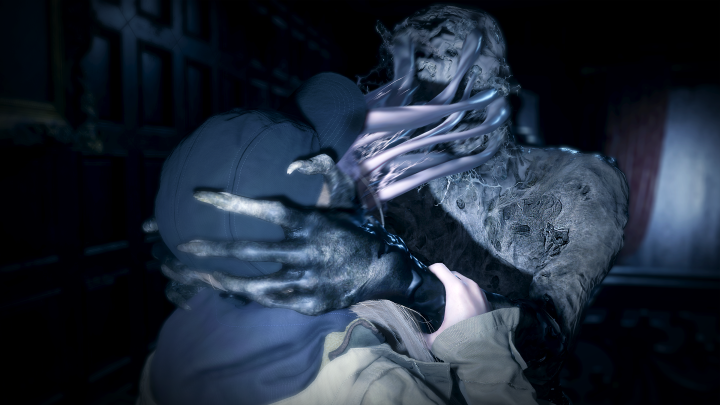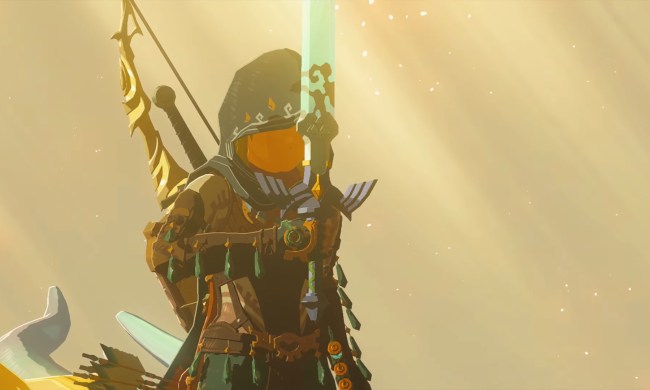For the first two decades of its life, the Resident Evil series was relatively easy to follow. I don’t mean in terms of its convoluted, lore-packed narrative. Rather, you could easily pin down what it was trying to accomplish. Resident Evil games were a work of pulp horror, leaning into their B-movie influences to create cheesy zombie movie thrills with a commentary about corporate greed at its heart. Even its most hated games (looking at you, Resident Evil 6) followed that core philosophy.
That changed in 2017 with the release of Resident Evil 7. Something of a soft reboot, the game went back to the series’ survival horror roots by placing new hero Ethan Winters in a puzzle box house filled with jump scares. Though its gameplay was similar to the original Resident Evil (albeit with a first-person perspective shift), it was a thematic departure. The series’ big picture story of a greedy pharmaceutical company creating bioweapons took a back seat to Winters’ more personal family drama, as he searched for his missing wife. Its sequel, Resident Evil Village, would shuffle away even further by going full-on supernatural.
After Village, I was left wondering where the new version of Resident Evil was going. What were the thematic threads that would ultimately tie its gonzo story together? Resident Evil Village: Winters’ Expansion answers that question, specifically via its new Shadows of Rose DLC. Like the Fast and the Furious series, it’s all about family … and superpowers.
Mold breaker
Shadows of Rose gives more context to Village’s intriguing epilogue, which flashed forward in time to show Ethan’s daughter Rose all grown up. The ending scene implied that Rose had some sort of special powers and that she was working for a shadowy government organization now. How did we get there? The DLC partially, though not entirely, answers those questions.

The three-hour story carries Resident Evil’s goofiest story to date. Other kids are bullying Rose because of her weird mold powers, calling her a freak. In an attempt to become normal, she enters Mother Miranda’s consciousness (who is basically a brain in a jar at this point) to try and find purifying crystals that will rid her of her powers. It’s a psychological journey through Rose’s subconscious as her emotional baggage turns into effective horror imagery, like doppelganger versions of her having their faces slurped up by monsters.
That premise allows Capcom to reuse locations from Village, but mutate them ever so slightly. A large chunk of the expansion takes Rose to Castle Dimitrescu, for instance, where she needs to complete a puzzle box hunt for three masks so she can grab a crystal. It plays like a traditional Resident Evil experience in miniature form. Later sequences delve even deeper into that idea while doubling down on surreal horror. It’s a bit of a victory lap for Village’s best moments, but it works thanks to Rose, whose “sick of this crap” angst makes her a fun hero.
The twist, though, is that Rose has special powers that allow her to freeze enemies in place and break mold barriers that are blocking paths in the house. Resident Evil has always had a supernatural streak, one that was fully realized in Village, but this is the hardest the series has pushed in that direction. Rose essentially has superpowers, which add an extra layer of depth to the combat. The freezing ability is essentially a better (and more fun to execute) version of the arbitrary blocking system featured in the base game.

A personal story
While it’s all very silly, even by Resident Evil standards, it does crystallize what Capcom is really going for in its new iteration of the series. Like 7 and Village, Shadows of Rose is a personal story about family. Rose’s powers aren’t just for show; they’re a physical reminder of her deceased father. The DLC is largely about Rose working through her identity as a daughter of Ethan Winters, grappling with the genetic curse (or gift) that’s been handed down from someone she never got a chance to meet. It’s a simple story about closure, told via over-the-top horror tropes.
It’s a small story, but one that retroactively snaps the series’ current trajectory into place. Capcom isn’t so much creating zombie B-movies ripe with heady social commentary anymore; it’s making supernatural soap operas about family trauma. You could even see that in the series’ recent Netflix adaptation, which dealt with Albert Wesker’s relationship with his kids.
Whether or not that direction is as exciting as the Resident Evil games of old is up to fans, but Shadows of Rose at least gives a sense of how the horror game’s formula will continue to evolve. Expect Resident Evil 9 to feature more super powers, melodrama, and daddy issues.
Resident Evil Village: Winters’ Expansion launches on October 28 for Xbox One, Xbox Series X/S, PlayStation 4, PS5, and PC.


